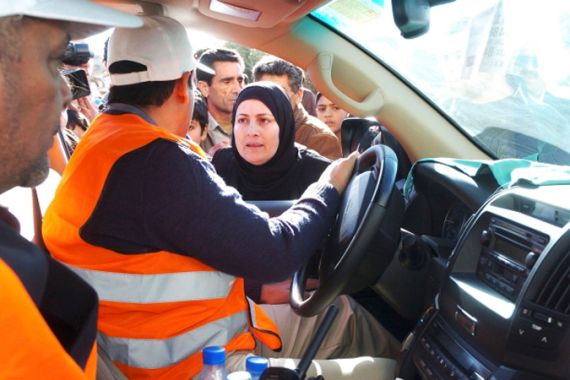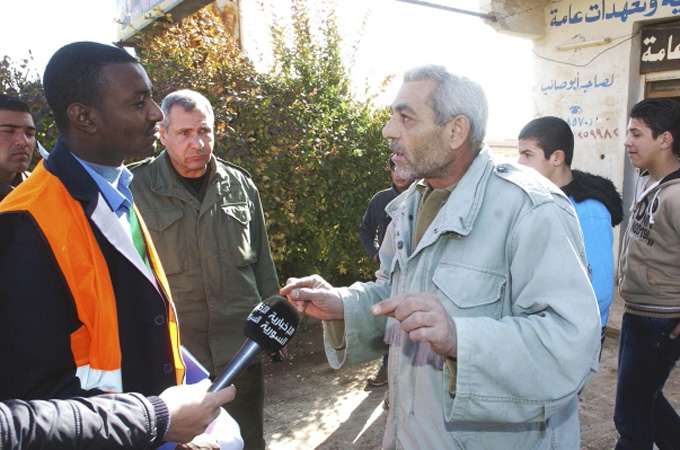Monitors to stay in Syria despite ‘mistakes’
Arab League observers to continue mission as Qatar’s prime minister says that “mistakes” have been made.

 |
| Syrian state television showed what it said was a group of Arab League observers visiting the city of Deraa [Reuters] |
Arab League peace monitors will stay in Syria to check on the government’s compliance with a promise to end 10 months of violence against pro-democracy protesters, Arab government sources said, despite criticism from Qatar’s prime minister that they had made “mistakes”.
The league’s special committee on Syria is due to meet in Egypt on Sunday to debate the initial findings of the mission, which has been criticised by Syrian activists who question its ability to assess the violence on the ground.
Anti-government protesters are planning a day of action on Friday, calling for the UN to step in after what they say is the failure of the league’s mission.
The move comes as activists reported two protesters were killed overnight, on top of 30 deaths on Thursday.
The team of monitors arrived in Syria last week to verify whether the government was implementing the agreement to scale back its military presence in cities and free thousands of prisoners detained since the uprising began last March.
Activists say the teams do not have enough access and are escorted by Syrian authorities, who they say are manipulating them and hiding prisoners in military facilities.
After meeting Ban Ki-moon, the UN Secretary-General, in New York on Wednesday, Sheikh Hamad bin Jassim Al Thani, Qatar’s prime minister, pointed out that the league’s mission was the first of its kind.
“I said we must evaluate the types of mistakes it made and without a shadow of a doubt I see mistakes, even though we went in to observe, not to stop the violence,” he said.
Sheikh Hamad, who chairs the Arab League committee on Syria, did not elaborate on the mistakes but said he was seeking technical help from the UN.
‘Objectivity and professionalism’
Syria said it provided the monitors with all the facilities they needed and maintained that “terrorists” aided from abroad were behind the growing unrest in the country.
“What we are looking for is objectivity and professionalism,” Jihad Makdesi, a foreign ministry spokesman, told Lebanon’s Manar television.
However, a senior Syrian official who has defected to the opposition movement, denied government claims that the ongoing violence was caused by terrorists.
|
Interview with Mahmoud Souleiman Hajj Hamad, the head inspector of Syria’s defence ministry |
In an interview with Al Jazeera, Mahmoud Souleiman Hajj Hamad, the head inspector of the country’s defence ministry, said: “We were analysing and seeing for ourselves that the regime’s story about armed gangs going out and killing protesters was all lies.
“I confirm there are no armed gangs, they are all unarmed protesters.”
Sheikh Hamad said the League would soon hear the monitors’ findings and assess the mission’s viability.
“We are going to evaluate all sides of the situation and we will look at the possibility of the delegation continuing or not and how we can carry on this mission, but we need to listen to the reports of those who were on the ground first,” he said.
On the likelihood of Syria being referred to the UN Security Council, Sheikh Hamad said: “We always try to create a solution to this crisis within the Arab League, but that depends on the Syrian government and the extent of its clarity with us in producing a solution to the crisis.”
If the Arab monitors were pulled out, it could open the door for foreign intervention, a scenario many Arab countries want to avoid.
Syria is a major player in the region and is strongly supported by Iran and groups such as Hezbollah and Hamas.
The league has suspended Syria’s membership, citing President Bashar al-Assad’s failure to adhere to its plan to stop a crackdown, which the UN says has killed more than 5,000 people since March.
Cairo summit
The league’s committee on Syria comprises the foreign ministers of Egypt, Sudan, Qatar, Oman and Algeria, but a source in the league said other countries were invited to join on Sunday and they could call for an urgent meeting of all Arab ministers the same day.
Some officials at the League said countries such as Sudan, Jordan, Egypt and Algeria were wary of ending the mission early, fearing that declaring it a failure might provoke Western military intervention in Syria.
“They are afraid this will become a pattern and could happen later to their own countries,” said a league official who asked not to be identified.
Another Arab government representative said the committee was likely to discuss possible measures to help the monitors, such as providing them with vehicles so they can travel around the country without the assistance of Syrian authorities.
He said they would not discuss changing the head of the monitoring mission, a Sudanese general whose selection was criticised by international human rights groups because of his own country’s human rights record.